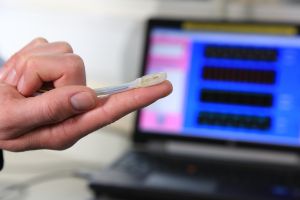
CENSIS delivers 200th innovation project
- This story first appeared in the Herald newspaper, 14 July 2020
A university spin-out is aiming to revolutionise the way men are screened for prostate cancer by providing more accurate testing at an early stage, leading to reduced patient anxiety and more efficient diagnosis.
IntelliPalp Dx – based at Heriot-Watt University – has developed a device called ProstaPalp, which provides an objective exam for prostate cancer diagnosis and management. CENSIS is delighted to be working with IntelliPalp to accelerate the process of bringing the test to market.
Statistics from the charity Prostate Cancer UK show that there are 47,500 diagnoses each year for prostate cancer – equivalent to 129 every day – while as many as one in eight men develop the disease in their lifetime.
However, the diagnosis of prostate cancer has typically relied on a combination of a doctor conducting a physical examination – with a degree of subjectivity – and prostate specific antigen (PSA) testing, which is not disease-specific and often produces false positives.
Those who test positive are referred for MRI scans followed by biopsies if there is still a concern, which can be a painful experience and lead to side effects such as infection, bleeding and occasionally erectile dysfunction. Analysis suggests that, worldwide, around 4.5 million positive PSA tests lead to biopsies each year and more than three-quarters (76%) of these patients do not have prostate cancer.
Professor Alan McNeill, Co-founder and Chief Medical Officer at IntelliPalp Dx, said: “Prostate cancer research has focussed on finding a test that can sit alongside PSA screening, helping to identify men most at risk of the disease. There are some forms of the cancer that are aggressive, but the majority are indolent and unlikely to impact on a man’s lifespan. While they may still require active surveillance, there is no need for these patients to go through with a biopsy and the complications it entails.
“With ProstaPalp, we believe that we will be able to find the cases that are significant and determine their severity quickly after testing, only sending those who are likely to have cancer for an MRI scan and biopsy. The technology will provide a lot more certainty for patients and deliver quicker results, reducing unnecessary anxiety for patients. Rather than relying on subjective assessment by the human finger, it will bring a level of reproducible objectivity to what was previously a qualitative measure and help the health service focus investigation and treatment on those who need it most.”
Fitted to the end of the index finger under a doctor’s glove, ProstaPalp oscillates against the surface of the prostate to measure its firmness, which has been identified as an indicator of cancerous cells. Malleable to the human finger and activated at specific frequencies, the device draws on an algorithm to determine the risk of cancer and, with the addition of machine learning, it will draw on more data over time.
During initial trials with patients, it has accurately detected areas of the prostate with clinically significant cancer. Surveys conducted during the device’s trials have also found patients prefer the use of Prostapalp over existing testing methods.
Bob Reuben, Co-founder of IntelliPalp Dx and Professor of Materials Engineering at HWU, added: “The idea behind ProstaPalp is to discern the relationship between changes in the structure and stiffness of the prostate, and link this likelihood of cancer being present. The device is vibrated gently in contact with the organ measuring it at 12 different points to provide a map of where cancerous nodules are present.
“Essentially, we are aiming to emulate the human sense of touch through a mechanical device to bring greater precision, repeatability, and objectivity to an area of primary healthcare that is heavily reliant on qualitative assessment. Few people have tried this at an engineering level and our initial results have been highly successful. The same principles could be applied to other forms of human tissue assessment, further down the line, and in more challenging environments.”
Development of the ProstaPalp device represents CENSIS’s 200th collaborative research project since the innovation centre’s inception in 2013. With a project portfolio now valued at £37.5m, the centre has supported industry and public sector organisations in activities to innovate through the development and use of sensor and imaging systems and Internet of Things technologies.
Michael Fletcher, CENSIS Business Development Director said: “Reaching our 200th project milestone is testament to Scotland’s growing appetite for innovation and collaboration, underpinned by new technology. The ProstaPalp device is a great example of the ground-breaking medical research currently underway in Scotland, and the growing and evolving role that sensors are playing in the healthcare sector.
“Deliverable at the earliest and most anxious stage of the process of diagnosing prostate cancer, it will have a significant positive impact on patient experience and help health services better focus attention and resources. The test will also allow a technology researched, designed, and made in Scotland to realise global impact and benefit.”